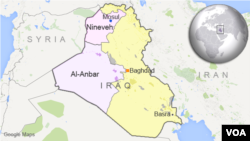Several rockets were launched Thursday and Friday against bases hosting troops from the U.S.-led anti-jihadist coalition in Iraq and Syria, security officials and a war monitor said.
Such attacks were frequent early in the war between Israel and Hamas Palestinian militants in Gaza but since then have largely halted.
"Four rockets fell in the vicinity" of Ain al-Assad base in Anbar province, an Iraqi security source said.
Another security official said an attack occurred with "a drone and three rockets" that fell close to the base perimeter.
A United States official said initial reports indicated that projectiles landed outside the base without causing injuries or damage to the base.
All sources spoke on condition of anonymity because they are not authorized to speak to the media.
At least one rocket also fell near a base of the coalition in the Conoco gas field in Deir Ezzor province of eastern Syria, according to the Britain-based Syrian Observatory for Human Rights war monitor.
The Observatory said a blast was heard in the area but there were no immediate reports of casualties.
The rocket was fired from "zones under the control of pro-Iranian militia" groups, said the monitor, which relies on sources inside Syria.
There was no immediate claim of responsibility for either attack.
Iran-backed armed groups in Iraq have largely halted similar attacks on U.S.-backed troops in recent months.
The latest attack come after a security meeting this week between Iraqi and U.S. officials in Washington on the future of the international anti-jihadist coalition in Iraq. Iran-backed groups have demanded a withdrawal.
The U.S. Defense Department said Wednesday "the delegations reached an understanding on the concept for a new phase of the bilateral security relationship."
This would include "cooperation through liaison officers, training, and traditional security cooperation programs."
On July 16, two drones were launched against Ain al-Assad base, with one exploding inside without causing injuries or damage. A senior security official in Baghdad said at the time he believed the attack was meant to "embarrass" the Iraqi government before the security meeting.
For more than three months, as regional tensions soared over the Israel-Hamas war in Gaza, United States troops were targeted by rockets and drones more than 175 times in the Middle East, mainly in Iraq and Syria.
The Islamic Resistance of Iraq, a loose alliance of Iran-backed groups, claimed the majority of the attacks, saying they were in solidarity with Gaza Palestinians.
In January, a drone strike blamed on those groups killed three U.S. soldiers in a base in Jordan. In retaliation, U.S. forces launched dozens of strikes against Tehran-backed fighters.
Since then, attacks against U.S. troops have largely halted.
Baghdad has sought to defuse tensions, engaging in talks with Washington on the future of the U.S.-led coalition's mission in Iraq.
The U.S. military has around 2,500 troops in Iraq and 900 in Syria with the international coalition.
The coalition was deployed to Iraq at the government's request in 2014 to help combat the Islamic State group, which had taken over vast swathes of Iraq and neighboring Syria.
Islamic State remnants still carry out attacks and ambushes in both countries.




